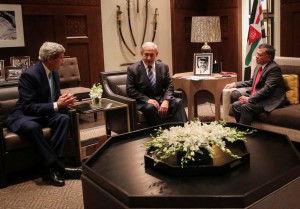Calm must be restored in Jerusalem before direct or regional Israeli-Palestinian peace talks can commence, said US Secretary of State John Kerry on Thursday, following a meeting in Amman with Prime Minister Benjamin Netanyahu and King Abdullah of Jordan.
After the meeting, Kerry said that a mechanism had been developed to end the violence in Jerusalem and the Temple Mount. He was short on details, except to say that it would ensure that the status quo would be maintained at the holy site.
“The status quo is clear and the status quo will be maintained. The prime minister has made it clear that he will uphold that,” Kerry said.
King Abdullah and Netanyahu also discussed their shared commitment to counter the growing wave of extremism in the region, he said.
They also talked about ways the regional partners could work together on security arrangements that advance common interests between them, Kerry said.
The US, he said, is committed to advance peace between the Israelis and Palestinians.
“Everyone understands there is deep, pent-up frustration and years of disappointment. That’s why we had nine months of negotiations, and we would all like to see that effort reengaged, because peace is the only sustainable answer to the conflict,” he said.
“I was pleased that Netanyahu and [Palestinian Authority President Mahmoud] Abbas made clear their desire to see this situation deescalated and move in the right direction,” Kerry said.
Kerry and King Abdullah also spoke about ways to coordinate their efforts against Islamic State.
During the tripartite meeting the three leaders spoke with Egyptian President Abdel al-Sisi by phone.
The secretary of state said that he had spoken earlier in the day with Abbas, who “made it clear that he will do everything possible to restore calm” and halt the violence.
They also talked about affirmative steps to stop incitement, Kerry said.
Abbas was not party to the trilateral meeting, Kerry said, because “it just is not yet the right moment for the two sides to really come together.”

He explained that Abbas and Netanyahu need to see that the situation has changed before such a meeting can take place.
Kerry said he has faith in both Netanyahu and Abbas’s commitment to peace. Netanyahu “has deep concerns about what is going on and the rise of violence. How can you be the prime minister of a country where people are being run over by trucks and vans, or stabbed in the street and killed, and not respond?”
“This is a test. I believe the prime minister came here because he is concerned. He made firm statements tonight because of that,” he said.
Following the meeting, Jordanian Foreign Minister Nasser Judeh said, “His majesty has explained to Kerry that we cannot allow the position of Jerusalem to be undermined, with his majesty emphasizing the importance of the city to Christians and Muslims.”
“The tension in Jerusalem has sparked tension not just in Jerusalem, but elsewhere in the West Bank. We need to think of the larger picture, peace, a solution to all final-status issues and security not just for Israel but for the entire region,” he said.
The Amman meeting comes amid a crisis in relations between Jerusalem and Amman over Jerusalem and the wave of violence between Israelis and Palestinians, including in Israel’s capital. Jordan has recently recalled its ambassador to Amman for consultations, and there is no date yet for his return.
Abbas and Abdullah have accused Israel of wanting to change the status quo on the Temple Mount, whose Muslim holy sites are under the control of the Islamic Wakf. Only Muslims are allowed to pray there, but Jews and Christians can visit.
In the 1994 peace treaty with Jordan, Israel recognized that the Jordanian king has a special responsibility toward Muslim holy sites in Jerusalem.
